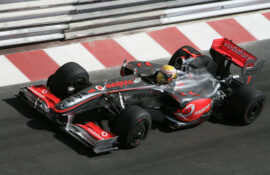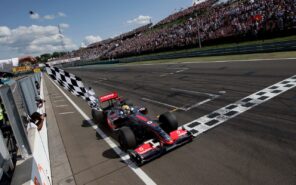McLaren MP4-24 specs & info
McLaren's F1 car of 2009
The 2009 Formula One season was marked by a plethora of rule changes, which led to the introduction of new designs and innovations in the world of racing. Among the standout cars of that season was the McLaren MP4-24, an engineering marvel that encapsulated the brand's commitment to performance and technological advancements.
Designed by Paddy Lowe, Neil Oatley, Tim Goss, and Simon Lacey, the MP4-24 was McLaren's contender for the 2009 FIA Formula One World Championship. It featured a unique aerodynamic package and a modified Mercedes-Benz FO 108W engine that complied with the new regulations introduced for that year.
One of the most significant rule changes in 2009 involved the reduction of downforce, which was achieved by narrowing the front wing and raising the rear wing. This led to the development of the MP4-24's distinctive aerodynamic design. The car featured a wide and low front wing, which was developed to maximize airflow under the car and generate downforce. The rear wing, on the other hand, was designed to be taller and narrower, following the new regulations.
The 2009 season also saw the introduction of the Kinetic Energy Recovery System (KERS) in F1 cars. McLaren was among the first teams to adopt this innovative technology, which allowed the MP4-24 to store energy generated during braking and use it as an additional power boost when needed. This system, although not without its challenges, provided a significant advantage on tracks with long straights, where drivers could utilize the extra power for overtaking.
Another notable feature of the MP4-24 was its suspension system. The car utilized a double wishbone suspension with inboard torsion bars and dampers at both the front and rear, which were designed to maintain optimal tire contact with the track and improve overall handling.
The MP4-24's initial performance was not as strong as McLaren had hoped, with the car struggling to match the pace of its competitors in the early stages of the season. However, the team's relentless dedication to development and improvement led to a remarkable turnaround. By the mid-season, the MP4-24 had become a formidable contender on the grid, securing multiple podium finishes and even two race wins.
One of the most memorable moments of the 2009 season came at the Hungarian Grand Prix, where Lewis Hamilton secured McLaren's first victory with the MP4-24. This marked a turning point in the team's campaign, as the car continued to improve and demonstrate its potential in the remaining races.
The MP4-24's other race win came in Singapore, with Hamilton once again showcasing the car's prowess under the floodlights of the Marina Bay Street Circuit. Despite the challenging start to the season, McLaren managed to finish third in the Constructors' Championship, thanks in part to the MP4-24's impressive development and strong performances on the track.
In retrospect, the McLaren MP4-24 stands as a testament to the team's dedication to innovation and their ability to adapt to new challenges in the ever-evolving world of Formula One. While it may not have been the most successful car in McLaren's storied history, the MP4-24 remains an important milestone in the team's journey and a fascinating piece of engineering for motorsport enthusiasts.
Technical specifications McLaren MP4-24 F1 car
Chassis: McLaren moulded carbon fibre/aluminium honeycomb composite incorporating front and side impact structures. Contains integral safety fuel cell
Front suspension: Inboard torsion bar/damper system operated by pushrod and bell crank with a double wishbone arrangement
Rear suspension: Inboard torsion bar/damper system operated by pushrod and bell crank with a double wishbone arrangement
Suspension dampers: Koni
Electronics: McLaren Electronic Systems control units incorporating electronics for chassis, engine and data acquisition. McLaren Electronic Systems also supplies the electronic dashboard, alternator voltage control, sensors, data analysis and telemetry systems
Bodywork: One-piece engine cover and sidepod covers. Separate floor section, structural nose with integral front wing
Tyres: Bridgestone Potenza
Radio: Kenwood
Race wheels: Enkei
Brake calipers: Akebono
Brake master cylinders: Akebono
Batteries: GS Yuasa Corporation
Steering: McLaren power-assisted
Instruments: McLaren Electronic Systems
McLaren MP4-24 Engine
Type: Mercedes-Benz FO 108W
Capacity: 2.4 litres
Cylinder configuration: 90° V8
Maximum rpm: 18,000 (FIA regulatory limit for 2009)
Piston bore maximum: 98mm (FIA regulation)
Number of valves: 32
Fuel: Mobil High Performance Unleaded (5.75% bio fuel)
Lubricants: Mobil 1 – for higher performance, lower friction and better wear resistance
Weight: 95kg (minimum FIA regulation weight)
McLaren MP4-24 Transmission
Gearbox: Semi-automatic, 7 forward and one reverse
Driveshafts: McLaren
Clutch: Hand-operated













LAST 3 F1 Fan COMMENTS